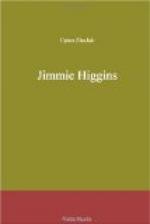And then Comrade Mary Allen, the Quaker lady, who believed in moral force applied through the ear-drums. She stood in the aisle with her armful of pamphlets and her red sash over her shoulder, proclaiming, “In the name of liberty and fair play I protest against this outrage! I will not see my country dragged into war without asserting my right of protest! I stand here, in what is supposed to be a Christian city; I speak in the name of the Prince of Peace—” and so on, quite a little speech, while several embarrassed young men in khaki were trying to find out how to hold their rifles and a shouting Quakeress at the same time.
And then Comrade Schneider, the brewer. He had been up on the stage with the singers, and now got somehow to the front. “Haf we got no rights in America left?” he shouted. “Do we in this audience—”
“Shut up, you Hun!” roared someone on the front of the crowd, and three policemen at once leaped for Comrade Schneider, and grabbed him by the collar, twisting so hard that the German’s face, always purple when he was excited, took on a dark and deadly hue.
Poor Jimmie Higgins! He stood there with his armful of “War, What For?”—trembling with excitement, itching in every nerve and sinew to leap into this conflict, to make his voice heard above the uproar, to play his part as a man—or even as a Comrade Mabel Smith, or a Comrade Mary Alien, or a Comrade Mrs. Gerrity, nee Baskerville. But he was helpless, speechless—bound hand and foot by those solemn pledges he had given to Eleeza Betooser, the mother of babies.
He looked about, and near him in the aisle he saw another man, also bound hand and foot—bound by the memory of the smash in the face which had broken his nose and knocked out three of his front teeth! “Wild Bill” saw a policeman watching him now, eager for another pretext to leap on him and pound him; so he was silent, like Jimmie. The two of them had to stand there and see the fundamental constitutional rights of American citizens set at naught, to see liberty trampled in the dust beneath the boots of a brutal soldiery, to see justice strangled and raped in the innermost shrine of her temple. At least, that was what you had seen if you read the Leesville Worker; if on the other hand you read the Herald—which nine out of ten people did—then you learned that the forces of decency and order had at last prevailed in Leesville, the propaganda of the Hun was stifled for ever, the mouthers of sedition had felt the heavy hand of public indignation.




